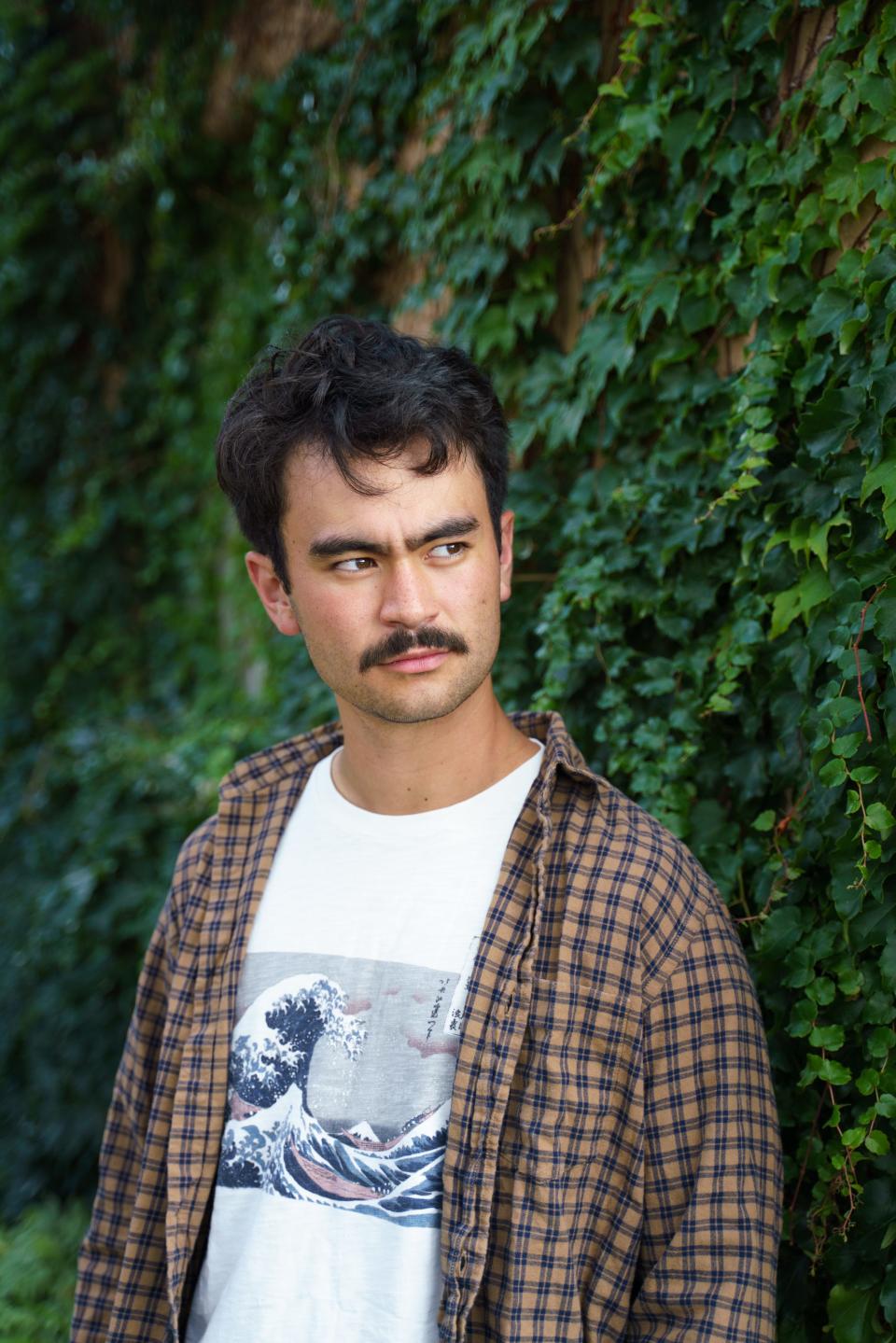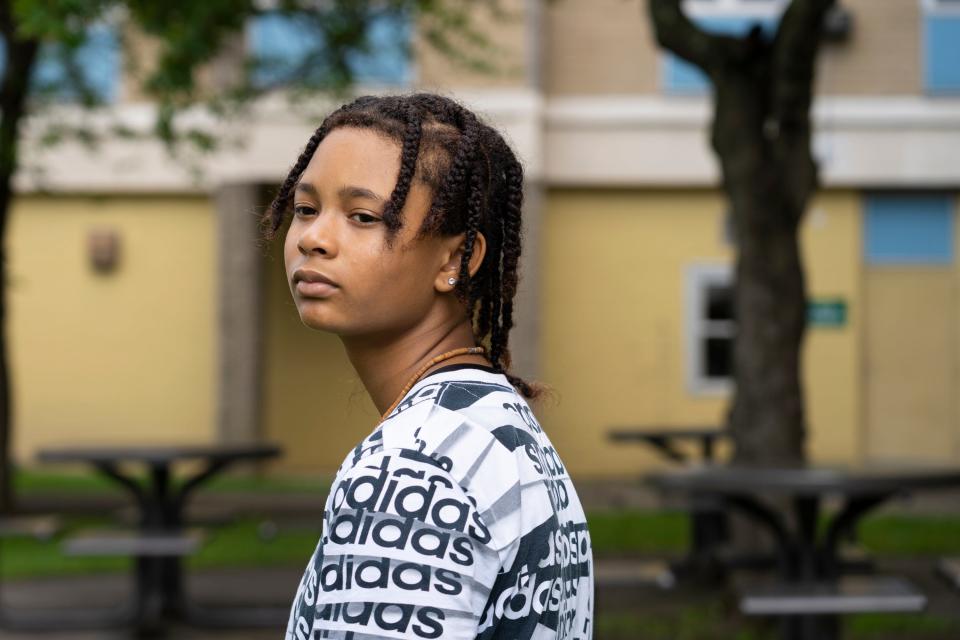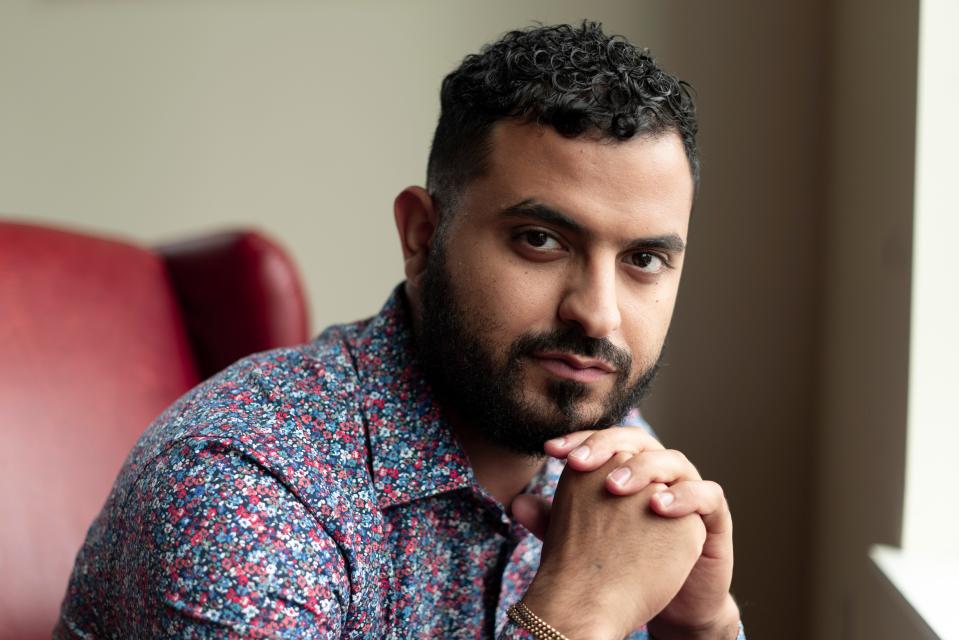For Gen Z, Sept. 11 is history. Here’s how they’ve come to understand the attacks.
- Oops!Something went wrong.Please try again later.
NEW YORK – Ben Chang was 15 months old in the day care at 5 World Trade Center when the first plane hit the twin towers, more than 90 floors above his head.
Staff rushed Chang and the other infants out and piled them into shopping carts from a nearby grocery store as passersby ripped off their shirts and draped them over the children's heads, protecting them from the white dust falling from the sky.
Chang grew up hearing stories about his parents' frantic journey to locate him that day. He celebrated reunions with the staff who saved his life. He sat through history lessons in school, feeling a confusing connection to an event he couldn't remember.
It wasn’t until a couple of years ago, Chang said, that he came to understand the attacks while sitting in a dark theater in Brooklyn watching "Vice," a black comedy about former Vice President Dick Cheney.

"I kind of always really thought of it as a terrorist incident, and I hadn't thought about its impact on the greater spectrum of the world," said Chang, 21.
Though 9/11 was a formative memory for many millennials and life-changing for older generations, Gen Z has no collective memory of what happened that day. Many research institutions identify 1996 as the cutoff point between generations specifically because those born afterward have little to no memory of the attacks.
Instead, many Gen Zers learned about 9/11 as a historical event through family stories, classroom discussions, social media, Hollywood movies, anniversary news coverage, museums, books and more.
USA TODAY spoke with dozens of Gen Zers, shaped by varying degrees of proximity to the event, about how their experiences and identities have informed their understanding of what happened 20 years ago – and how that continues to play out.
‘Maybe we don’t have control over our destinies’: Touching stories from the class of 9/11
The photo of a grieving 9/11 son was unforgettable. 20 years on, he recalls his mom's sacrifice.
‘The teachers just told us that there’d been an attack’
Katie Brockhage, 24, has a vague image in her mind of a blurry TV screen at a friend's house in Nevada that day. The first conversation she remembers having about 9/11 was at school, in first or second grade.
"The teachers just told us that there'd been an attack and that it was these bad people over in some country I'd never heard of," said Brockhage, a defense contractor for the U.S. Air Force in Colorado Springs.
Brockhage is among the oldest of her generation. Many research institutions and psychologists define Gen Z – also known as iGen, Homelanders and Zoomers – as those born between 1997 and 2012. In 2021, they're 9 to 24 years old, and they're nearly 70 million strong.
They’ve grown up during the political rise of Donald Trump, the Black Lives Matter movement, school shootings, an increasingly dire climate crisis, a deadly pandemic and the longest war in U.S. history. Compared with previous generations, Gen Zers are less likely to say they’re proud to be American.
Most Gen Zers who spoke with USA TODAY said they first learned about 9/11 in school on the anniversary of the attacks. Many spoke of New York City, of the victims and the first responders.
What Chang learned about 9/11 didn't leave much of an impression.
"It became a very political event, and in situations like that, the way schools talk about things is they’re very detached from it," said Chang, who grew up in New York City. "The only thing I really understood about it is terrorists attacked the twin towers, lots of people died, and it was an important moment in American history."
Educators largely teach 9/11 on the anniversary and present it as "a significant event that needs to be witnessed and memorialized," according to a survey in 2019 of more than 1,000 U.S. teachers by researchers at the University of Wisconsin-Madison.
The "vast majority of teachers did not report engaging students in any depth" on the lead-up to the attacks or the invasion of Iraq, the controversies related to Guantanamo Bay detainees and their U.S. Supreme Court cases, or use the events to challenge views of Islam and terrorism, according to the survey.
Brockhage, despite growing up far from where the attacks happened, said 9/11 was often discussed in her household – overheard in her parents' discussions and in chats with her dad while out fishing – and she came to understand it as a "terrible, horrible" event.
"Almost before I really was able to get an understanding for myself, there's all these feelings that sort of just get handed down from the adults and from the authority figures around you," she said.
Brockhage enlisted in the Army Reserve out of high school in 2015.
"It presented this very clear threat or danger to America," Brockhage said. "I always wanted to join the military, to help be a protector and to help prevent anything like that from happening again."
A ‘much more complicated’ understanding
Many Gen Zers said their knowledge of what happened that day has changed as they've grown older. Many said they understand 9/11 beyond the singular event and have become critical of U.S. domestic and foreign policy.
Chang said seeing the Cheney movie in 2018 was the first time he had a sense of 9/11's place in a historical timeline. The satirical, highly fictionalized film critiques Cheney's political rise through the 2000 presidential election recount, 9/11 and the U.S. invasions of Afghanistan and Iraq.
Brockhage said she's developed a "much more complicated" understanding of 9/11 and its aftermath as her political views have evolved. That evolution began when her childhood best friend came out as transgender, and she began to discover her own identity as a trans woman.
"I had all this, like internalized negativity about the LGBT community that went hand in hand with a lot of other conservative views and ideologies," Brockhage said. "As I discovered that about myself, it's like, wait a minute, if queer folks aren't the enemy, then maybe there are some other worldviews that aren't as simple as I thought they were initially."
Many Gen Zers said social media exposed them to more information – and conspiracy theories – about 9/11, as well as information about the U.S. wars in Afghanistan, Pakistan, Iraq, Syria, Yemen and elsewhere.
Brockhage said she often sees memes and TikToks alluding to U.S. intervention abroad. One particular meme stands out: In the first frame, a cook spills oil in the kitchen; in the second, a squad of U.S. soldiers are setting up shop to claim the oil.
"For people my age, this incredibly passionate, very assertive discussion about everything political – and we really do get into everything – it's just sort of defined us," Brockhage said.
Sept. 11 brought a sense of national unity. Why has the pandemic been marred by division?
Did 9/11 permanently change life in the US? More Americans say so than ever before
‘We still live it’
Despite not being alive or old enough to remember, Gen Zers said 9/11 is a lived experience for thousands of them. They've grown up mourning loved ones they never knew, serving as caregivers for relatives sickened by toxins and veterans struggling with their health, and spending holidays without friends and family who were serving overseas.
Megan Carr, 13, grew up in Hudson, New York, accompanying her grandmother on hours-long drives to a hospital. Her "Mimi," Megan Carr-Wilks, was a detective with the New York Police Department when she responded to the World Trade Center. She developed lung cancer after her assignment to the search-and-recovery efforts.

When Megan was 9 years old, her grandmother began to lose her hair and struggle to walk. Megan moved in for three weeks, helping her Mimi to the bathroom and running to the store. They watched "Law and Order" together, ordered Chinese food and sat out on the porch talking late at night.
That fall, in 2017, her grandmother died, and her name was added to the 9/11 memorial in Manhattan.
Her old uniform hangs in Megan's closet, wrapped in plastic.
"I felt like something was took from me – like a missing piece," Megan said.
Caitlin Spor never got to know her father. She was 9 months old when her dad, Joseph P. Spor Jr., a second-generation fireman in the Bronx, responded to the World Trade Center, traveling up and down the south tower twice before it collapsed.
Each year, she, her mother and three older siblings traveled into the city for a ceremony, visited a cemetery and ate lunch at a firehouse.
"It was so hard for me to understand," said Spor, 20, a junior at the University of Rhode Island. "It’s really hard to still comprehend it to this day."
Spor never learned about 9/11 in school – teachers pulled her out of class on the day they covered the topic.
Instead, she learned through her mom, stories told at the firehouse, news coverage and a community of kids who had experienced the same thing, talking in their bunks late at night.
For four years, Spor attended America's Camp, a weeklong camp for children who lost relatives on 9/11. Hundreds of kids attended from 2002 to 2011, and many later worked as counselors, including some who put on a weeklong camp for the survivors of the Sandy Hook Elementary School shooting in 2012 in Newtown, Connecticut.
"Most of the kids my age don’t really know how much the world changed that day," Spor said at her home in Yorktown, New York, where photos of her father adorn the walls and an "America's Camp" jacket hangs in her kitchen. "I don't think kids know how hard it is, even though it's been almost two decades now. We still live it."
‘She said that she was looked at differently’
For Ayoub Affaneh, 24, Sept. 11 wasn't an open topic of discussion growing up in Bridgeview, Illinois, a suburban Chicago neighborhood known as "Little Palestine." But for several years, his mother stopped wearing her hijab when they went to the mall or park.
About four years after the attacks, when Affaneh was 8, she started wearing it again. Years later, she told him why.
"Before then, I wouldn't say we were comfortable enough, or she was comfortable enough, to tell us about it," said Affaneh, who is Palestinian American. "She said she just didn't feel comfortable wearing it in the streets. She said that she was looked at differently."

Muslim and Arab Gen Zers who spoke to USA TODAY said 9/11 is also a lived experience and has cast a long shadow over their communities. They spoke of family and friends moving to new neighborhoods and changing names. Several said they have grown accustomed to being pulled aside by airport security.
Affaneh said that as he grew older, friends and family opened up about the anti-Muslim bigotry they faced in the wake of 9/11. Relatives said they were spat on and had their hijabs ripped off. Affaneh learned how hundreds had protested outside his mosque in the weeks after the attacks, causing it to shut down Friday prayers.
He did research on the computers at the public library, reading about the Patriot Act and the National Security Entry-Exit Registration System. He's grown critical of U.S. foreign and domestic policy and said other members of his generation have, too.
"I think we look into things a little differently than before," he said. "We like to kind of go deeper and say, ‘OK, why is this happening there?’ I think it's different than the millennials or the boomers."
Affaneh said although his older family members were more directly affected by 9/11, he has not been immune to blatant hate. When he was 19, nearly 15 years after the attacks, an older man pulled up in the car next to him and yelled "terrorist."
"I was like, are you kidding me?" Affaneh said.
‘We’re looking at history’
Two decades later, 9/11 has been plunged back into the news.
Many Gen Zers are following coverage of the U.S. withdrawal from Afghanistan. Scenes from Kabul airport and the suicide bombing have been seared in their minds. Nearly all of the 13 U.S. service members killed in the attack were Gen Z. Five were babies on 9/11.
"Looking at these pictures, it looks just like Saigon. We’re looking at history," Chang said. "It feels, not inevitable, but so similar. It makes you question, what was the point?"
Brockhage said she pulled into her driveway after work late last month and sat there crying.
"All my friends that I know that were deployed over there are now back home wondering if any of it really made a difference," she said.
Zainora Babayee, 23, a junior at the University of Virginia, said she's living through the "darkest days" of her life.
The oldest of seven siblings, Babayee grew up in Kabul, Afghanistan's capital, where her father worked as a private contractor with U.S. special operations forces. She said she had little understanding of why U.S. forces were there. She recalls listening to the news as a young girl when she first heard the phrase 9/11, thinking it was "some fancy word" she didn't know.
Babayee was 18 when her family moved from Kabul to Virginia and she became a permanent U.S. resident. When her younger siblings began to attend U.S. schools, they came home telling her what they'd learned of 9/11, and she began to do her own research.
In recent weeks, Babayee said she's been staying up late on her phone, frantically trying to contact friends and more than a hundred cousins in Afghanistan. She can't eat and goes to sleep crying in her dorm room.
"When I wake up I want to scream and let the world know what's happening," she said. "I see my peers around me enjoying their life, but I'm on my phone checking who got killed."
The oldest of her siblings understand what's happening, Babayee said, but the youngest know only that something is wrong. Like Gen Z before them, the next generation – some just old enough to remember – sit at home, watching videos of devastation.
"We try not to let them watch, but they’re kids," Babayee said. "They're curious. They see all of this."
Follow Breaking News Reporter Grace Hauck on Twitter at @grace_hauck.
This article originally appeared on USA TODAY: Gen Z and Sept. 11: For young generation, the attacks are history

